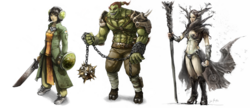Hard fantasy
| Fantasy |
|---|
 |
| Media |
|
| Genre studies |
| Subgenres |
|
| Fandom |
|
| Categories |
|
|
Hard fantasy is a subgenre of fantasy literature that strives to present stories set in (and often centered on) a rational and knowable world. Hard fantasy is similar to hard science fiction, from which it draws its name, in that they all aim to build their respective worlds in a rigorous and logical manner.[1][2]
Origins[]
Jane Lindskold, whose writing has been called hard fantasy, in 2009 attributed the origin of this term to an unnamed radio interviewer.[1] Brian Stableford traces the term origins to 1980s as proposed by unnamed writers of historical fantasy.[3]
Definition[]
The definition of hard fantasy is amorphous in practice. Marie Brennan remarked in 2008 that "the term has been around for a while without anybody ever achieving consensus on what it refers to" and proposed a broad definition that "it’s any story that treats magic like science" or fantasy stories that "are concerned with how stuff works, and why".[4] Brian Stableford in concurred that the term "is used in several different ways", all attempting to create an analogy with the term hard science fiction with first definitions being reserved for works that are "scrupulously faithful to historical and anthropological data" outside having some magic or myth plot elements, and later definitions being more broad.[3]
John Clute and John Grant in The Encyclopedia of Fantasy defined it as a genre where "magic is regarded as an almost scientific force of nature and subject to the same sort of rules and principles", and which "might refer to fantasy stories equivalent to the form of hard sf known as the ‘scientific problem’ story, where the hero must logically solve a problematic magical situation".[2]
Lindskold enumerates the key points of the genre as respecting reason, logic and "real world laws".[1] Fernando Savater draws similar lines while contrasting hard fantasy with soft fantasy, through it is unclear whether he distinguishes between fantasy and science fiction, as he lists Jules Verne and H. G. Wells as examples of writers of the hard fantasy.[5]
Misha Grifka-Wander has argued that the term is both not very popular and not accurate.[6]
Examples[]
The following works have been called hard fantasy:
- Dragon Cauldron (1991) by Laurence Yep[2]
- The Iron Dragon's Daughter (1993) by Michael Swanwick[7]
- Lord Darcy series (1964-1979) by Randall Garrett[3]
- The Lord of the Rings by J. R. R. Tolkien (1936-1970s)[8][9]
- The Kingkiller Chronicle by Patrick Rothfuss[9]
- Memory, Sorrow, and Thorn (1988–1993) by Tad Williams[8]
- Metropolitan (1995) by Walter Jon Williams[7]
- Mistborn (2006–2016) by Brandon Sanderson[10][9]
- A Song of Ice and Fire series by George R. R. Martin (1996–present)[9]
- (1986) by Geoff Ryman[7]
- Master of the Five Magics (1980) by Lyndon Hardy[11]
See also[]
- Hard and soft magic systems
- Hard science fiction
- Science fantasy
- Soft science fiction
- Unknown—a pulp magazine dedicated to hard-type fantasy
References[]
- ^ a b c Lindskold, Jane (January 6, 2009). "Hard Fantasy". tor.com. Retrieved 2012-04-24.
- ^ a b c John Clute; John Grant (15 March 1999). The Encyclopedia of Fantasy. St. Martin's Press. p. 451. ISBN 978-0-312-19869-5.
- ^ a b c Brian Stableford (13 August 2009). The A to Z of Fantasy Literature. Scarecrow Press. p. 191. ISBN 978-0-8108-6345-3.
- ^ Brenann, Marie (2008-07-16). "Hard fantasy". SF Novelists. Retrieved 2019-12-25.
- ^ Fernando Savater (1982). Childhood Regained: The Art of the Storyteller. Columbia University Press. pp. 44–45. ISBN 978-0-231-05321-1.
- ^ Grifka-Wander, Misha (2019). "Moving Forward: Gender, Genre, and Why There's No Hard Fantasy". Hobgoblins of Fantasy: American Fantasy Fiction in Theory. pp. 61–82.
- ^ a b c Dozois, Gardner, Modern Classics of Fantasy, page xix. St. Martin's Press, 1997.
- ^ a b Keith, Olaf (22 September 2016). "Not too much longer now…".
- ^ a b c d "Hard Fantasy". bestfantasybooks.com. 2016. Retrieved 1 September 2020.
- ^ "Annotation Mistborn Chapter Thirteen".
- ^ Stableford, Brian (2009). The A to Z of Fantasy Literature. Scarecrow Press. p. 191. ISBN 0810863456.
External links[]
- Hard fantasy, sfnovelists.com, 2008
- "Hard Fantasy". bestfantasybooks.com. Retrieved 17 January 2016.
- Fantasy genres